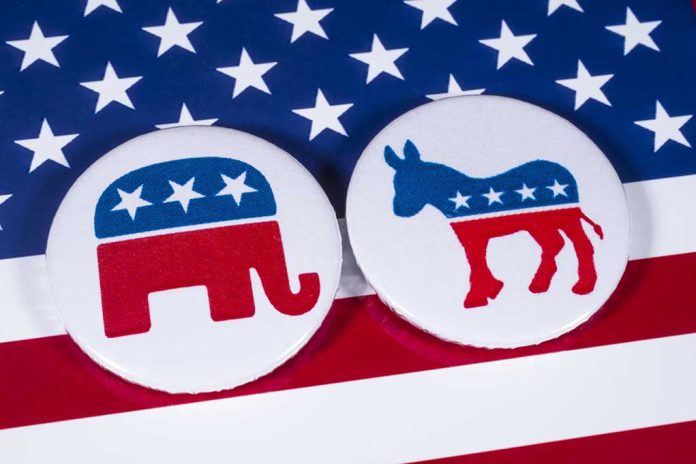
President Trump and former President Biden find themselves in a rare moment of agreement, jointly opposing the growing power of federal judges to issue nationwide injunctions that can halt government policies with a single ruling.
Key Takeaways
- Both Trump and Biden administrations have urged the Supreme Court to limit federal judges’ authority to issue nationwide injunctions.
- Nationwide injunctions have become increasingly common, with both Republican and Democratic judges using them to block opposing administrations’ policies.
- The Trump administration faces multiple legal setbacks blocking key agenda items, raising tensions between the executive and judicial branches.
- “Judge-shopping” has allowed litigants to strategically file cases in courts likely to rule in their favor.
- The Supreme Court recently sided with Trump by allowing his administration to freeze $65 million in DEI-related education grants.
Unusual Bipartisan Agreement on Judicial Limits
In a political landscape marked by deep division, the Biden and Trump administrations have found common ground on an issue affecting executive power. Both presidents have called on the Supreme Court to restrict the ability of federal judges to issue nationwide injunctions that can instantly halt government policies across the country. These powerful judicial tools have proliferated in recent years, creating a situation where a single district judge can effectively veto presidential initiatives.
Democrats have been crying foul for YEARS on nationwide injunctions—but now they're using them to stop Trump's agenda in its tracks
The double standard is glaring
Let's return our courts to the Constitution and BAN nationwide injunctions pic.twitter.com/IW1z5uXk5Z
— Josh Hawley (@HawleyMO) April 2, 2025
The issue has gained urgency as President Trump faces numerous court orders blocking or delaying significant portions of his agenda. Legal setbacks have hampered his plans to reshape the federal government, end birthright citizenship, and control federal spending, leading to growing frustration within the administration.
Constitutional Tensions Rising
As court challenges mount against Trump’s policies, constitutional scholars warn about potential consequences if court orders are ignored. Former Attorney General Alberto Gonzales, who served under President George W. Bush, expressed concern about executives disregarding judicial authority, stating, “To willfully ignore the courts could be grounds for impeachment in my judgment – or at least public condemnation and congressional censure.”
While the Trump administration has publicly criticized judicial decisions, it has generally followed legal norms by appealing unfavorable rulings rather than defying them outright. However, rhetoric from administration officials has intensified, with presidential advisor Stephen Miller declaring, “Judges have no authority to administer the executive branch. Or to nullify the results of a national election.”
Political Shifts on Judicial Power
The controversy highlights the shifting political attitudes toward nationwide injunctions. Republicans and conservatives who previously supported these judicial actions when they blocked Biden administration policies now oppose them when targeting Trump initiatives. Similarly, many Democrats who criticized judicial overreach during Biden’s term now embrace court interventions against Trump policies they oppose.
This political inconsistency extends to the practice of “judge-shopping,” where litigants strategically file cases in courts they believe will be sympathetic to their arguments. Critics point out that both parties have utilized this tactic when it served their interests, fueling calls for reform in how cases seeking nationwide relief are assigned to judges.
Recent Supreme Court Intervention
In a significant development, the Supreme Court recently sided with the Trump administration in a dispute over the Department of Education’s freeze of diversity-related grants. The decision allows the administration to keep $65 million in grants frozen, despite a lower court’s order to disburse the funds.
The Judicial Council of the United States has recommended random assignment of judges for cases seeking nationwide injunctions, but this guidance has not been universally adopted. Without systemic reform, the tension between executive authority and judicial review seems likely to continue, regardless of which party controls the White House.
Sources:
As judges stymie Trump with injunctions, pressure builds on U.S. Supreme Court
White House officials bristle as the courts throttle parts of Trump’s agenda
Supreme Court sides with administration over Education Department grants



